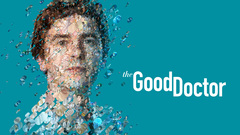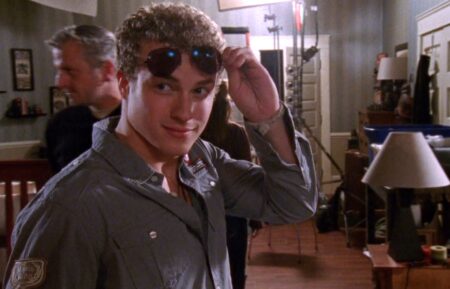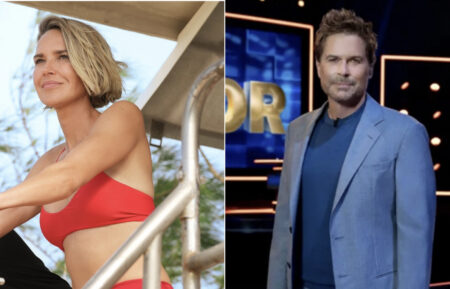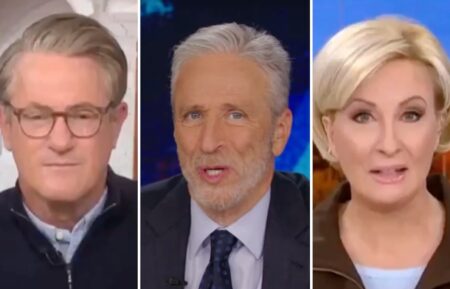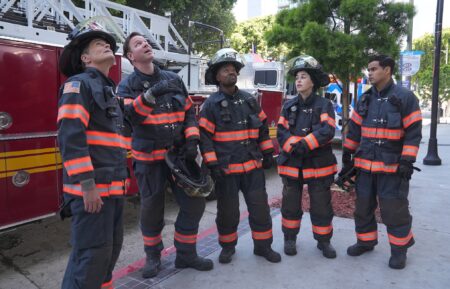‘The Good Doctor’ Bosses Explain Shaun & Glassman’s Emotional Endings & That Time Jump

Spoiler Alert
[Warning: The following contains MAJOR spoilers for The Good Doctor series finale, “Goodbye.”]
The Good Doctor has come to a poignant end. The series finale saw Dr. Shaun Murphy (Freddie Highmore) taking on the most personal medical cases of his career as he fought to save his best friend, Dr. Claire Browne (Antonia Thomas), and his father, Dr. Aaron Glassman (Richard Schiff), both of whom had cancer.
Glassman chose not to treat his terminal glioblastoma, opting instead to spend his final six months enjoying every second of time he had left. That came with stepping down from his position as co-president of St. Bonaventure Hospital. Shaun refused to accept Glassman’s decision and gathered all the doctors to form a treatment plan for him and Claire, who was experiencing life-threatening complications from her breast cancer.
Shaun struggled to acknowledge the real possibility that both Glassman and Claire could die, so he spent much of the episode fighting to find a miracle solution for them both. The autistic surgeon proved himself capable of medical marvels again when figuring out a new way to fight off the virus that was killing Claire, but the FDA denied his and Charlie’s (Kayla Cromer) emergency pitch.
In the ultimate display of Shaun’s evolution, he was willing to lose his medical license to use the experimental treatment on Claire. Glassman took the fall in Shaun’s place so that his career as a surgeon could continue. There was no convincing Glassman to seek treatment for his cancer, however. And Lea (Paige Spara) urged Shaun not to waste what time he had left with his father.
Glassman died six months later, but he made the best out of his final months with his family. Claire’s arm had to be amputated to save her life, ending her surgical career, but she survived. The last shot of Shaun and Glassman in the series showed them saying “I love you” to each other while riding a carousel, and then the series ended with a time jump years into the future that revealed what happened to Shaun and the rest of the St. Bons crew next.
The reveals came as Shaun gave a Ted Talk about how being neurodivergent has helped save people over the years. He and Claire started a foundation named after Glassman that supports neurodivergent representation in medicine, and the St. Bons family was watching with pride in the audience. That audience included a married Claire and Kalu (Chuku Modu) with their young daughter, and we also learned that Shaun and Lea went on to have another child, a daughter. Everyone at St. Bons got a happy ending in the end.
Here, The Good Doctor co-showrunners David Shore and Liz Friedman break down everything from the series finale, including how Glassman and Shaun spent their final months together.
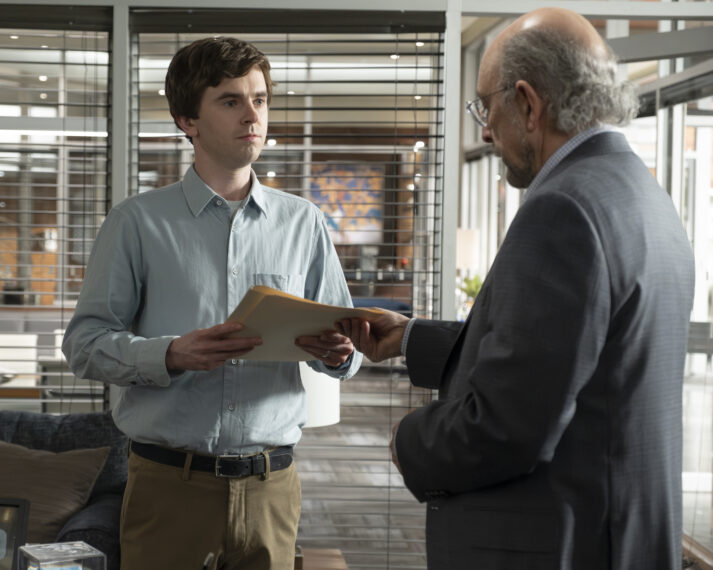
Disney / Jeff Weddell
Congratulations on landing the series finale. I thought it was a very moving, poignant ending. I wept! Were there other characters you wanted to bring back but couldn’t?
Liz Friedman: Oh, thank you. It’s a shame that Andrews [Hill Harper] wasn’t able to make an appearance. [Harper left the series to run for U.S. Senate.]
David Shore: Some of the characters we’ve loved are no longer with us, and some are seeking political office, but it’s still a shame. We respect and admire him for this, but it was too bad.
The time jump: was that always the ending you envisioned?
Shore: Liz developed that some time ago, but not at the beginning. To be honest, when I’m starting a show that’s a luxury I don’t indulge in. It feels just too arrogant. The idea that a show would last long enough to deserve that kind of ending, I just don’t go there. At a certain point, I was thinking there were a number of landmarks that we’ve gone past that I thought would be lovely, like getting married and having a baby, and we blew past those and did other wonderful stories. But it’s certainly something we’ve thought about all year, but I wouldn’t say we’ve always thought of it.
When did the idea for the carousel and the time jump come to you, Liz?
Friedman: I think we had that pretty early as we started to break the story [for the series finale]. We knew that we wanted to do the Ted Talk. What I knew I wanted to leave the audience with is that Shaun is still out there doing what he does, both medically and in terms of changing people’s minds. I just want that to still be going. So really it was about how can we tell people that first of all, he’s going to be OK, and that our people are going to be OK, and that even after going through losses and some tumult that they are still out there doing their heroic work. And I feel like we delivered that.
Would the plot with Glassman and Claire still have happened if there was a Season 8?
Friedman: I would’ve introduced Glassman’s cancer at the end of Season 7 and then played that into [Season] 8. And then I’m not sure about Claire, but I probably would want to save her return for something as substantial as this.
Did you have a plan in mind for Season 8 outside of this Glassman arc, or was it too early to start planning for that?
Friedman: Oh, it’s never too early [laughs], but that was the big piece. And there’s other stuff that we have kicked around, but I’m very happy with the way we ended the show and we did have time to tie up threads in a way I feel very pleased with. I hope the audience finds it to be a rewarding experience, so I don’t want to get people too distracted about things that might have been.
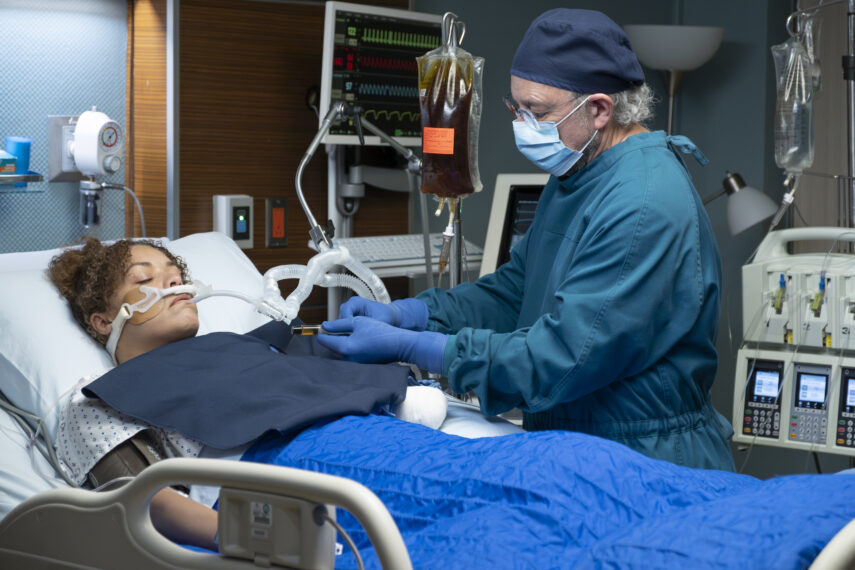
Disney / Jeff Weddell
Totally understandable. It was a very neat and tidy ending. It wasn’t predictable, but everything got resolved, which I thought was crystal clear writing. So hats off to you for that, because not every show can do that.
Shore: Thank you.
Friedman: Thank you. David and I talk about the fact that, in my mind, the gold standard is surprising but earned. So it sounds like we got kind of close there.
That’s how I would describe it. It was heartwarming, it was heartbreaking, but I felt taken care of watching it, if that makes sense.
Shore: It does, and it’s what we were going for, so that’s wonderful.
Friedman: Terrific.
Did you toy with any alternate endings?
Shore: Not really. There were slightly different versions of this, but I think once we came upon this general idea, we were pretty happy with it and ran with it pretty full on, right, Liz?
Friedman: That’s absolutely right. We had a bunch of little variations. David hired me for my very first staff writer job. I am very much the writer I am because of him. The thing I have learned from him is, we are hard on stories. You work it and you push it and prod it and make sure that everything is there for a reason and that it’s doing what it should, so that by the time that there is an outline that we both sign off on, we know what we’re doing.
I was really moved when Shaun was ready to lose his medical license to save Claire. It showed his growth in the most clear way that you could with Shaun. How does that describe Shaun and his journey throughout the seven seasons to you?
Shore: We spent a lot of time talking that through. Weirdly enough, that particular specific came relatively late in the process. The decision to have Shaun choose to sacrifice his career, even though it doesn’t often go that way, but be willing to do that is something we came up with and just felt so right as soon as we’d thought of it. It’s a lovely indication of how much he’s grown through the seven years and how much he’s learned.
Friedman: We always talk about that it isn’t that Shaun doesn’t have emotions. There can be a perception that people who are on the spectrum don’t have emotions, but of course he does. But what’s a considerable issue for him is, it’s quite hard for him to be in touch with them. It’s very logical, and he always has access to that part of his brain. I think neurotypicals can get very swept away with the emotion. That doesn’t happen to Shaun. For him to understand that the meaning of Claire to him is enough that he would give up his entire career, to some extent, logically, that doesn’t make any sense. But emotionally it’s incredibly true. So it really ends up being the perfect encapsulation of the progress he’s made.
Shore: And representative of what a good parent he’s going to be, as we’ve already seen. And it’s all about Glassman leaving him in a better place than he found him, as all parents hope to do.
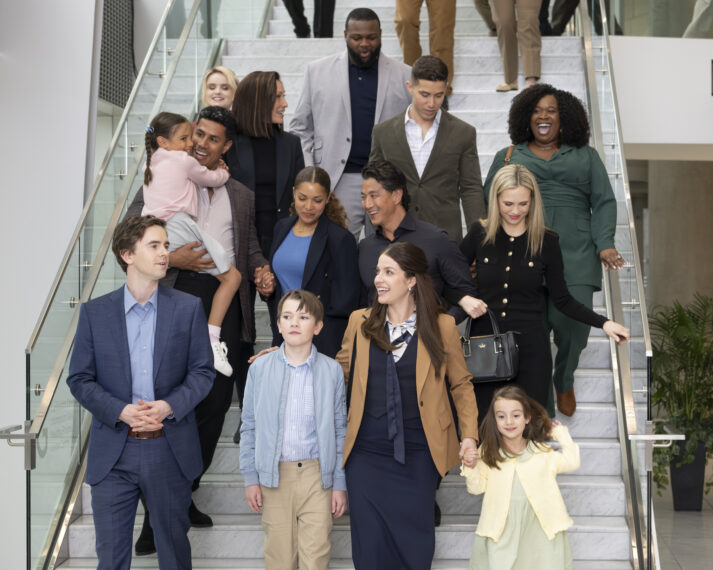
Disney / Jeff Weddell
Is putting himself at risk for the sake of someone he loves something that Shaun learned from Glassman?
Friedman: Interesting. I hadn’t thought of it that way.
I think it was certainly on display with Hannah [Ruby Kelley, Schiff’s real-life daughter].
Shore: It was definitely on display, and it’s definitely there. In this final lesson that Shaun got from Glassman, I like to think it wasn’t about a specific lesson. It was about a general lesson on humanity.
What is that lesson?
Shore: It’s a broader thing than just simply sacrificing yourself. It’s all about who Shaun is as a human being now. But you’re not wrong. At the same time it absolutely is there.
We’re the sum of our experiences, right? It’s not just one thing that moves us to do something. It’s a collection of things. So I’m sure Glassman is in there. I’m sure Lea is in there. Steve is in there.
Shore: Exactly. I think both Steves are in there.
Friedman: Yes, all of the Steves.
Do you have an idea of how long Glassman lived after his diagnosis?
Shore: I assumed the prognosis was more or less correct that he was going to have six months or so.
Friedman: Six months. That’s what I assumed too.
And did he do a lot of bowling during that time?
Shore: He and Shaun definitely did some bowling.
Friedman: Although I wonder if they tried it once and then went, “I don’t like bowling.” Then they went to the carousel.
Shore: [Laughs]
Do you imagine that Shaun took any time off from work during those final months as part of, as Lea described it, his plan to say goodbye to his father?
Friedman: Yes, I think so.
Shore: Yeah. It’s all part of the lesson we’ve just been talking about. He gave up his important work for the important task of bowling with his father.
The Good Doctor, Available now, Hulu

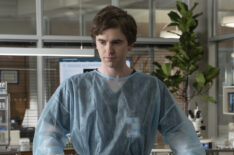
![Why Did [Spoiler] Die on 'The Good Doctor'?](https://www.tvinsider.com/wp-content/uploads/2024/04/the-good-doctor-season-7-episode-5-asher-jerome-noah-galvin-giacomo-baessato-234x155.jpg)
